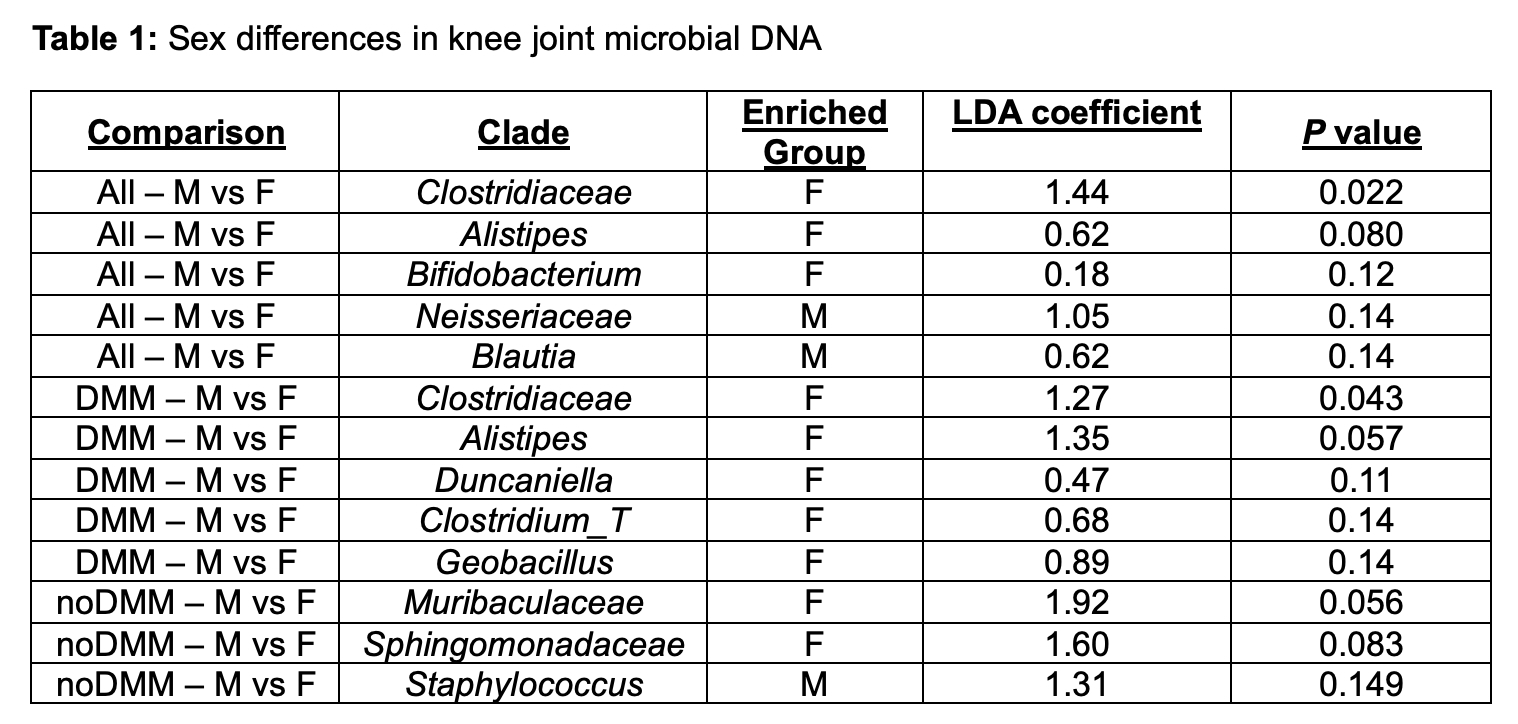Session Information
Date: Tuesday, October 28, 2025
Title: (1780–1808) Osteoarthritis & Joint Biology – Basic Science Poster
Session Type: Poster Session C
Session Time: 10:30AM-12:30PM
Background/Purpose: Recent studies have suggested an association between the gut microbiome and osteoarthritis. We have previously shown that the joint microbiome is derived at least in part from the gut microbiome. However, there is little information on the role of the joint microbiome in OA development or progression, or on the differences in the joint microbiome based on biological sex. The goal of the present study was to examine sex differences in knee joint microbial DNA and the impact of opposite sex transplantation on the joint microbiome with and without PTOA using paraffin-embedded tissue sections of the knee joint.
Methods: Diluted cecal microbiome samples (200uL or vehicle control) was transplanted via single-timepoint oral gavage at 11 weeks of age. One week later, OA was induced in the right knee via destabilization of the medial meniscus (DMM) surgery. Mice were euthanized 8 weeks after DMM and knee joints were processed into formalin-fixed paraffin-embedded (FFPE) blocks. Eight 6µm sections per knee were then subjected to DNA extraction from both knees in each animal (DMM’d and unoperated) in four groups of mice (male and female controls and transplanted F- >M, transplanted M- >F). DNA was extracted using a QIAamp FFPE Tissue Kit, quantified using Qubit dsDNA HS Assay, and 16S libraries were generated by real-time quantitative PCR, using unique primer indexes. The pooled library was sequenced on an iSeq sequencer and the taxonomic profiles determined. 16S data were analyzed using a custom QIIME2-based pipeline, Maaslin2 was used for group and correlation analyses.
Results: When considering both DMM and control mice, 5 microbiome clades were discordant or trended towards discordance according to sex (cutoff P≤0.15), 5 were discordant when only OA knees were tested, and 3 when only non-OA knees were tested (Table 1). Next, we included specimens from cross-sex microbiome transplants and performed linear correlation analysis across the sex spectrum (male, female-into-male, male-into-female, female). Eight clades were correlated in this analysis (Table 2). We also evaluated the effect of OA by comparing DMM to non-DMM knees and found 5 clades discordant (Table 3). All of these were seen in our sex analysis and were enriched in female mice.
Conclusion: Although our study was underpowered, we nonetheless detected several statistically significant or suggestive differences in the mouse joint microbial DNA pattern according to sex, and these differences can be transferred to the other sex via gut microbiome transplantation. Intriguingly, all 5 of the DMM-associated microbial differences were concordant (all were reduced with DMM and enriched in female animals, which have a lower histologic severity following DMM). Although a larger confirmation study is indicated, our findings nonetheless suggest that sex-associated microbiome differences may be present in joint tissues and may correlate with OA propensity, underscoring the role of non-genetic factors in sex-specific OA susceptibility.
To cite this abstract in AMA style:
Kurra V, Lopez A, Szymczak A, Dyson G, Dube P, Mehta-d'Souza P, Jeffries M. Sex differences in knee joint microbial DNA of C57BL/6 mice and the effect of cross-sex microbiome transplantation [abstract]. Arthritis Rheumatol. 2025; 77 (suppl 9). https://acrabstracts.org/abstract/sex-differences-in-knee-joint-microbial-dna-of-c57bl-6-mice-and-the-effect-of-cross-sex-microbiome-transplantation/. Accessed .« Back to ACR Convergence 2025
ACR Meeting Abstracts - https://acrabstracts.org/abstract/sex-differences-in-knee-joint-microbial-dna-of-c57bl-6-mice-and-the-effect-of-cross-sex-microbiome-transplantation/


.jpg)
.jpg)